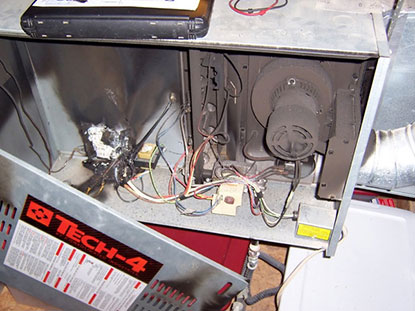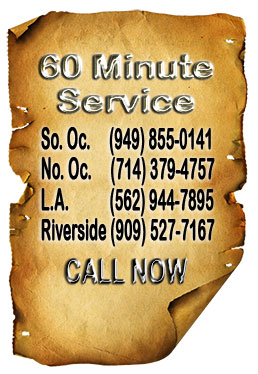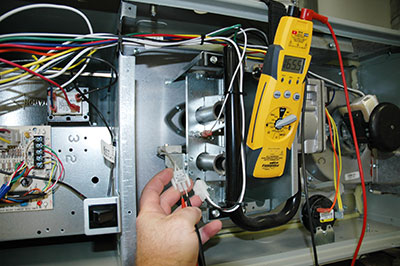Why Does My Furnace Make a Loud Banging Sound?


|
|
A loud furnace is a symptom of another problem that should be resolved quickly before using. |
 
The Burners Light on Fire and Then Shut Off?
For this to be explained we first have to separate the two major types of home furnaces and heaters.
Standing Pilot
You most likely have a lack of gas flow to the furnace. The gas valve could be broken or turned nearly off or the gas line is plugged going to the furnace.
Self-Igniting Furnace (electronic Ignition, spark ignition, hot surface ignition, direct spark ignition, glow coil ignition)
This is a common problem on self-igniting home furnaces and forced air heaters. This happens most often when the furnace safety circuit fails to recognize the flames. The most common way the furnace circuit board recognizes that a flame is present is a procedure called flame rectification.
Flame rectification occurs when the circuit board picks up a minute amount of DC power (direct current) on the furnace chassis or through a ground wire attached to the furnace burners. DC current is the power that is received from a battery. This type of power is not naturally occurring in a forced air heater.
The home heater makes DC power by energizing the natural gas flames with standard household AC power (alternating current like the plugs on your walls). The electricity then conduct through the flames (yes, natural gas flames conduct electricity) and the flames converts that electricity to pulsating Direct Current (DC). This then energizes the furnace burners with a very small amount of DC power which the circuit board picks up through its grounding circuit.
Simply-Weird-But now the board knows a flame is present.
What Can Cause This Problems?
 A poor furnace ground. All furnaces must be properly grounded. A poor furnace ground. All furnaces must be properly grounded.
 Power on the incoming ground or neutral. This typically occurs when someone taps into the dedicated home heater circuit to install lighting or motor driven appliances. Fluorescent lights are the worst. Imagine your furnace works perfectly fine until you switch on that bathroom fluorescent fixture. Once the light is off the furnace can resume working if it has gone in lock out mode. Power on the incoming ground or neutral. This typically occurs when someone taps into the dedicated home heater circuit to install lighting or motor driven appliances. Fluorescent lights are the worst. Imagine your furnace works perfectly fine until you switch on that bathroom fluorescent fixture. Once the light is off the furnace can resume working if it has gone in lock out mode.
 Poor burner ground. This wire can become corroded or disconnected. Poor burner ground. This wire can become corroded or disconnected.
 Improperly mounted circuit board. Most circuit boards are grounded through one of the mounting screws. If this is tight and clean a poor ground and intermittent burner firing can occur. Improperly mounted circuit board. Most circuit boards are grounded through one of the mounting screws. If this is tight and clean a poor ground and intermittent burner firing can occur.
 Dirty burners Dirty burners
 Dirty flame sensing rod. The flame rod needs to be cleaned from time to time. Corrosion inhibits the flow of electricity to the and from the burners. Dirty flame sensing rod. The flame rod needs to be cleaned from time to time. Corrosion inhibits the flow of electricity to the and from the burners.
 A defective, cracked or high ohm hot surface igniter. This is the item that glow whit hot prior to the gas valve releasing gas for the ignition sequence. Yes, it can light the burners and still be defective. These can and do wear out and do not always show any visible sign of damage. It must be tested with an electrical meter and different furnaces and hot surface igniters ohm out at different levels. A defective, cracked or high ohm hot surface igniter. This is the item that glow whit hot prior to the gas valve releasing gas for the ignition sequence. Yes, it can light the burners and still be defective. These can and do wear out and do not always show any visible sign of damage. It must be tested with an electrical meter and different furnaces and hot surface igniters ohm out at different levels.
 Cracked firebox blowing into the furnace burners. This can cause flame movement and it only takes an instant for the circuit to sense a lack of DC current to shut down. Cracked firebox blowing into the furnace burners. This can cause flame movement and it only takes an instant for the circuit to sense a lack of DC current to shut down.
 Too much gas pressure. The flames pass up the flame rod or igniter. Too much gas pressure. The flames pass up the flame rod or igniter.
 Too little gas pressure. The flames lazily wick around the igniter and/or flame rod. Too little gas pressure. The flames lazily wick around the igniter and/or flame rod.
 Dirty pilot assembly. Dirty pilot assembly.
 Defective induced draft motor. Defective induced draft motor.
 Blocked flue vent. Blocked flue vent.
In Nearly Every Instance
In nearly every instance the problems described above are simple to fix and your furnace can be repaired for a very minimal amount, usually just a service call. Give our expert HVAC department a call and set up your appointment today and you'll probably have heat tonight. |
With one simple Tune-Up, you are able to get more comfort, lower your energy cost and actually reduce the risk of future repairs. The number one cause of system failure is dirt! Don't let a dirty un-tuned system cost you money out of your pocket!